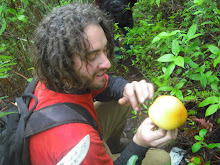
Rebecca Sanchez, representative of the Association Chuwi Tinamit,
explains to students about the plastic container recycling campaign.
By Fernando Magzul
Chimaltenango, Guatemala
The Association Chuwi Tinamit intiated a campaign that tries to teach primary students the habit to recycle the plastic remainders, with the purpose of avoiding the contamination of environment.
The Association Chuwi Tinamit, with the support of the University of Oregon, United States of America, explained that the campaign consists of teaching to the students, of grades first to sixth, the damage of the plastic in the environment , because it is one of the materials that takes more time in decomposing and when it is burned it is one of the main polluting agents in the air.
The American Rebeca Sanchez, coordinator of programs of this association, emphasized that the children must take advantage of the homemade resources, like backpacks, market bags, or other objects that help to carry the purchases, to lessen the amount of plastic bags in the streets and rivers.
Sadly, we are customary to go shopping without taking something to bring products, because we know that in the store or market the salesman will give a bag to us. With this habit we are deteriorating our environment, because recycling systems do not exist”, said Rebecca Sanchez.
The objective is to teach how to turn plastic packages of any size into ecological piggy banks.
Matt Paneitz, coordinator of projects, added that the purpose of the plan is for the student to have one or several ecological piggy banks and that after buying a product in the store or the market, deposits the wrapper in the bottle instead of throwing it in the street.
“If the young one buys a cake, they must learn that after eating it, they must deposit the wrapper in the bottle, like a piggy bank, declared Rebecca Sanchez.
They will extend the plan
Paneitz announced that this month they will visit the schools of this municipality where they will start the campaign.
“Also we are in contact with the head of the Municipality of Chimaltenango to take the campaign to the educative establishments departmental head this May”, he added.
General benefit
Authorities of the school Cojol Juyú assured that the campaign benefits not only the school, but in addition to the villagers, and for that reason they involved all the students in the project.
Olga Marina Salazar, director of the school, explained that the decision was made to give extra credit points for each two months that the students fulfill the habit to have an ecological piggy bank.
The Association Chuwi Tinamit created years ago the Educative and Recreational Center Ecological Chimiyá, to the east of town, where there is a football field, a basketball/football court, a playground with swings, slippery spots (slides), among other attractions.
Spanish Version (Original) taken from the daily Prensa Libre
La Asociación Chuwi Tinamit impulsó una campaña que intenta fomentar en los estudiantes de primaria el hábito de reciclar los desechos plásticos, con el fin de evitar la contaminación del medio ambiente.
La Asociación Chuwi Tinamit, con el apoyo de la Universidad de Oregón, EE. UU., explicó que la campaña consiste en enseñar a los estudiantes, de párvulos a sexto primaria, el daño del plástico en el medio ambiente, porque es uno de los materiales que más tarda en podrirse y cuando se quema es uno de los principales contaminantes del aire.
La estadounidense Rebeca Sánchez, coordinadora de programas de esta asociación, destacó que los niños deben aprovechar los recursos caseros, como morrales, costales de mercado u objetos que ayuden a cargar con las compras, para disminuir la cantidad de bolsas plásticas en las calles y ríos.
“Lamentablemente, estamos acostumbrados a ir de compras sin llevar algo para traer los productos, pues sabemos que en la tienda o mercado el vendedor nos dará una bolsa. Con este hábito estamos deteriorando nuestro medio ambiente, pues no existen sistemas de reciclaje”, declaró.
El objetivo es enseñar a convertir los envases de plástico de cualquier tamaño en alcancías ecológicas.
Matt Paneitz, coordinador de proyectos, añadió que la finalidad del plan es que el estudiante tenga una o varias alcancías ecológicas y que cuando compre un producto en la tienda o el mercado, deposite el envoltorio en la botella en lugar de tirarla en la calle.
“Si el niño compra una galleta, debe aprender a que después de comérsela, debe depositar el envoltorio en la botella, como una alcancilla”, explicó.
Extenderán plan
Paneitz expuso que este mes visitarán las escuelas de este municipio en las que impulsarán la campaña.
“También estamos en contacto con la Municipalidad de Chimaltenango para llevar en mayo próximo la campaña a los establecimientos educativos de la cabecera departamental”, agregó.
Beneficio general
Autoridades de la escuela Cojol Juyú aseguraron que la campaña beneficia no solo a la escuela, sino además a los aldeanos, y por ello involucraron a todos los estudiantes en el proyecto.
Olga Marina Salazar, directora de la referida escuela, explicó que se tomó la decisión de que el claustro otorgue puntos en cada bimestre a los estudiantes que cumplan con el hábito de tener una alcancía ecológica.
La Asociación Chuwi Tinamit creó hace años el Centro Educativo y Recreativo Ecológico Chimiyá, al este de la población, donde hay un campo de futbol, una cancha polideportiva, un parque infantil con columpios, resbaladeros, entre otras atracciones.

No comments:
Post a Comment